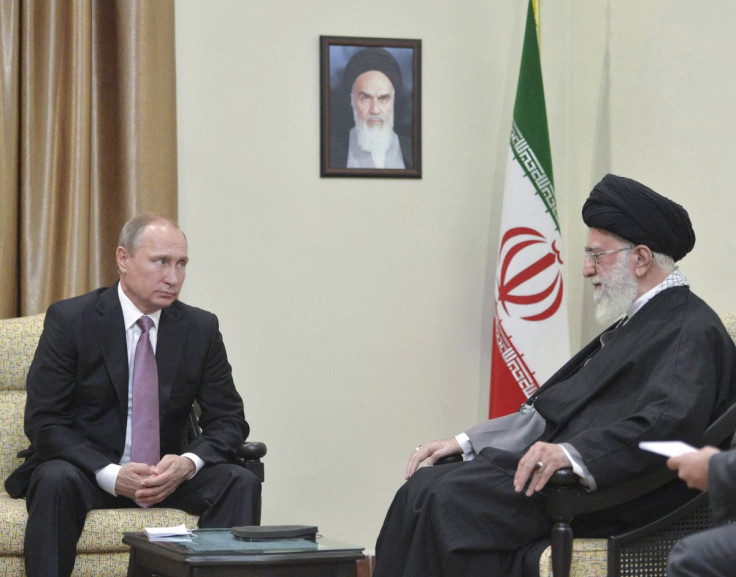Putin Furthers Plan To Weaponize Energy During Visit To Iran

Hours before Russian President Vladimir Putin landed in Tehran on July 19, Russia's state-owned Gazprom and the National Iranian Oil Company inked a pact worth $40 billion to start joint offshore gas projects. The deal includes gas and oil products swap, LNG projects and gas pipelines, and development of the Kish and North Pars gas fields.
On the bilateral level, Putin, who was on his first trip outside the former Soviet sphere since the Ukraine conflict began, earned kudos from Iran's Supreme leader Ayatollah Ali Khamenei who was vocal in flaying NATO for supplying arms to Ukraine.
Teaming up to withstand the sanctions, Putin said Iran's President Ebrahim Raisi was keen on strengthening cooperation in energy.
According to the head of the Iranian Oil, Gas and Petrochemical Products Exporters' Union (OPEX), Seyyed Hamid Hosseini, Russia is luring Iran by offering higher discounts as it did with India and other nations.
The sanctions-hit Russia is moving fast to mobilize the fresh momentum in its ties with Iran, which has been facing U.S.-led sanctions since 1979.
Iran sits on the world's second-largest gas reserves after Russia, but the U.S. sanctions have hindered access to technology and slowed the development of gas exports. Iran is now counting on Russia's support. Iran and Russia have a total of 70 trillion cubic meters of gas reserves, which is 30 percent of the world's gas reserves.
Russian supplies to the EU have fallen by more than 60 percent in recent weeks and there is a fear that Russia may down the shutters of the Nord Stream 1 pipeline -- a crucial transit point of Russian gas to Germany and beyond -- which may dry up supplies of gas to the bloc altogether.
CEO of the National Iranian Oil Company Mohsen Khojastehmehr said the pact with Gazprom was one of the biggest FDI deals in the history of Iran's oil industry.
For Russia, Iran has become a vital nation in the proposed North-South transport corridor, a 7,200 km network of sea, rail and road routes that can ship goods and oil from St. Petersburg to India, which defied warnings from the U.S. and bought oil from Russia and set up a rupee-ruble payment mechanism as Russia was removed from the international SWIFT banking system.
To undertake trade in their national currencies, Tehran's currency exchange has launched direct trading of Russian rubles for Iranian rials and is in the process of linking their electronic payment systems -- Mir (Russia) and Shetab (Iran).
By putting together a strategic partnership on energy, Putin plans to learn a few tips from Iran which boasts of decades-long experience in circumventing Western sanctions.
Working in Iran exposes Russian companies to secondary sanctions when secondary sanctions are not yet a feature of the U.S.-led sanctions on Russia. It will be interesting to watch how the Russian firms work in Iran.
Currently, bilateral trade between Iran and Russia, which increased to $4 billion in 2021, involving mainly foodstuff, is at a miserable level of trade for two economies of such significant clout. Russia's trade with Turkey, an economy similar in size to Iran, on the other hand, reached $33 billion last year.
Before Russian President Vladimir Putin set his foot on Iranian soil Ursula von der Leyen, European Commission President, was in Azerbaijan, Russia's northern neighbor, on July 16 with Kadri Simson, Europe's energy chief, in tow.
Though both Putin and Ursula have little in common, they were in the same boat with a common mission -- weaponization of energy as far as possible.
In a statement, the 27-member trade bloc, which gets 40 percent of its energy from Russia, the second largest energy producer in the world, said the transcontinental country of Azerbaijan has agreed to deliver at least 20 billion cubic meters of natural gas to the EU annually by 2027.
The EU is gearing up for a complete shutdown of gas supplies from Russia following Moscow's invasion of Ukraine. It is knocking on the doors of Qatar and Angola, among others, to diversify its energy imports.
Global oil prices have skyrocketed and higher living costs and rising consumer inflation have caused social unrest in many parts of the world, including Belgium and Italy in the European Union.
For decades, Russia has been Europe's most important source of natural gas, and the 27-member trade bloc is firm on reversing this. That is what took Ursula and Simson to the oil-rich Central Asian nation and Putin to the sanctions-hit Persian Gulf nation of Iran.
Just a few days before Putin's trip to Iran, U.S. President Joe Biden visited Iran's regional foe Saudi Arabia and requested the largest oil producer in the world to increase oil output.
Since there is a common enemy and a common problem, countries tend to help each other. Because of this, world leaders are knocking on the doors of oil-rich nations as oil, like food, becomes a weapon during wartime.
























